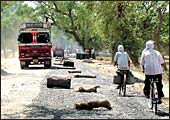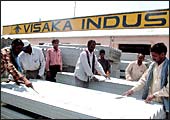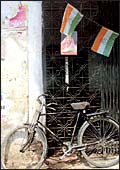|
RAEBARELI,
UTTAR PRADESH
April 8 & 9, 2006
A
little over a week ago, when the united Progressive Alliance (UPA)
and Congress President Sonia Gandhi arrived here on a whirlwind
tour of her constituency well ahead of the May 8 by-elections,
she was taken on a 12-km detour to reach a poll rally at Lalganj,
which is north-west of Raebareli. A worried District Pradesh Congress
President Uma Shankar Mishra thought that Gandhi would not be
able to handle the potholes that dot the 30-km stretch. But when
the lady, who is recontesting for the Lok Sabha seat after having
been forced to resign over the recent office-of-profit controversy,
learnt of the state of the road, she decided to check it out on
her way back to Raebareli. Lucky Lalganj. When the word reached
the mandarins in Delhi, I am told, they swung into action, trying
to complete a project held up for the last five years due to corrupt
local politicians and contractors.
If Gandhi could help it, the Raebareli-Lalganj
stretch would have been long complete. After all, this is the
district that has time and again returned her family members-including
her late mother-in-law Indira Gandhi, who gave this poor and obscure
district instant fame by picking it as her constituency in 1967,
and late father-in-law Feroze Gandhi-to the Lok Sabha. But the
fact is, Gandhi can't help it all. While Raebareli may be her
preferred electoral battleground, the state is run by her bitter
political rival, Mulayam Singh Yadav of the Samajwadi Party. Therefore,
there's a constant battle between the two parties over "ownership"
of Raebareli.
 |
| Off-track: The
Lalganj road linking Raebareli with Kanpur is a work-in-progress
of five years |

|
| For Madam: Visaka
Industries, owned by a Congress loyalist, chose Raebareli
over Lucknow |
 |
| Ringing in revival: Public
sector ITI's return to business has secured the future of
its 4,000 employees |
That said, the district has always received
special attention from the Congress government. Take the case
of ITI Ltd, whose manufacturing unit here was set up in 1973,
when Indira Gandhi was the Prime Minister. Thanks to a central
government plan announced in November 2005, the ailing public
sector telecom unit, which was on the verge of closure, is now
back in business. ITI has set up a new facility in collaboration
with Alcatel of France to manufacture equipment for GSM-based
mobile services (there's a second facility at Mankapur, also in
up). There's also talk of the unit manufacturing 3g equipment
sometime soon-a move that will make it the first PSU in the country
to do so. With 4,000 employees on its rolls and a monthly wage
bill of Rs 6 crore, ITI's Raebareli unit is crucial to the local
economy. "Some employees opted for the voluntary retirement
scheme, and most others remained employed but idle. But now there
is a ray of hope," says district magistrate Jitendra Kumar.
Other PSUs in the district such as NTPC in
neighbouring Unchahar are also expanding. NTPC, which employs
1,100 people here and generates 840 mw of power every year, plans
to add a fifth 210-mw unit here this year. Already, the Unchahar
power station, with a plant load factor of 95, is a showpiece
within NTPC. "The turnaround of the Unchahar plant has been
mentioned by President A.P.J. Abdul Kalam in his book India 2020-Vision
For The New Millennium," an NTPC official tells me. Other
projects in the pipeline include a GAIL gas outlet and a heavy
vehicle crash-testing facility, both of which will involve an
investment of a few hundred crores of rupees.
Some brave private sector entrepreneurs are
doing their bit to boost Raebareli's economy. Visaka Industries,
promoted by veteran Congress mp G. Venkataswamy, chose Raebareli
over Lucknow for its three-month-old asbestos plant because Gandhi
wanted it so. "We've set up the unit to create local employment,'
says Visaka's Managing Director, G. Vivekanand. Never mind that
the plant must brave 12 hours of power cut every day. There's
a reason why Raebareli must depend on the organised sector for
its livelihood. "Raebareli is not blessed with a traditionally-skilled
populace unlike Agra, which is famous for shoemaking, or Kanpur,
which is a hub for leather manufacturing," points out B.D.
Paulson, an IIT- and IIM-graduate and the local Superintendent
of Police.
 |
| Engineering a future:
Students get up close with IT at Feroze Gandhi Institute
of Engineering & Technology |

|
| Betting on jatropha:
Farmers have taken to the bio-diesel plant jatropha
for better returns |
No wonder, Raebareli is one of the 200 districts
covered under the central government's ambitious National Rural
Employment Guarantee Scheme. Apart from providing 100 days of
guaranteed work a year to every willing villager, the scheme should
put Rs 15 crore into the local economy. "I have emotional
bonds with Raebareli stretching over five generations right from
the days of Motilal Nehru," Gandhi said at a rally during
her March-end visit. Clearly, in her case, that's not all talk.
The New Raebareli
While the district of 2 million people is
still largely poor and backward, there are definite signs of progress.
For one, mobile phone subscriptions are soaring. From 10,000 in
May 2004, BSNL's cellular subscriptions touched 48,000 in January
this year. "There's a lot of pent-up demand here," says
K.K. Mishra, Chief Finance Officer, bsnl. For another, the business
of education is thriving. Ryan International, a private school,
opened a branch here a year ago, and the local polytechnic has
just been upgraded to an engineering college. Says Ram Pratap
Sharma, Principal of Feroze Gandhi Institute of Engineering &
Technology: "The college has thrown the doors of higher education
open to local people, who otherwise would be forced to migrate
to bigger cities." There's also a proposal to open a National
Institute of Fashion Technology in Raebareli. However, it hangs
fire because Chief Minister Mulayam Singh Yadav wants it in the
state capital, Lucknow.
 |
 |
| Sonia satrap:
DPCC President Uma Shankar Mishra runs the local office,
which surprisingly sported no cut-outs of Sonia |
Surprisingly enough, there's plenty happening
even in the farming community in and around the district. A self-help
group of farmers, Malikmauchaubara, is promoting cultivation of
bio-diesel feedstock, jatropha, after visits to Madhya Pradesh
and Rajasthan, where the plant has turned around the fortunes
of some farmers. "We hope to get a return of Rs 40,000 in
five years on an investment of Rs 12,000 per acre," says
Vijay Bahadur Singh, head of the self-help group. Apparently,
the jatropha plant lasts as much as 45 years, consumes very little
water, and is safe from the wild blue bulls (NILGAIS) that are
common here. "Even the Railways is keen to grow jatropha
along its tracks, and we have agreed to sell it 5 lakh plants
at Rs 5 each," reveals Singh.
Gandhi's election campaigners are, of course,
busy letting people know just where the credit is due. "Soniaji
has done all the hard work," one of them told this writer.
"It's a humbug that the development in Raebareli is due to
Sonia Gandhi. The credit must go to Mulayam Singh Yadav,"
counters Ram Naresh Yadav, senior leader, Samajwadi Party. It
may be that things will change faster in Raebareli if Congress
were to gain control of Uttar Pradesh. But, obviously, the locals
know better than to bank on political largesse alone. They are
already taking control of their own future, and learning to make
a living in a district that is a tug of war between two political
rivals. People in Raebareli may love the Gandhi family, but they
harbour no illusions about what Gandhi-or any other politician-can
do for them.
|











